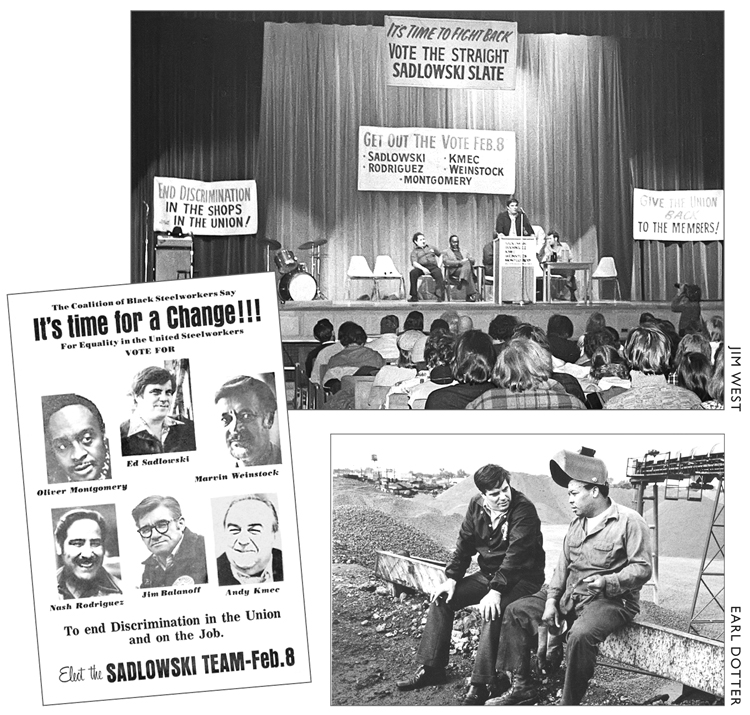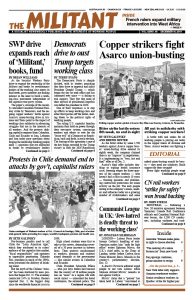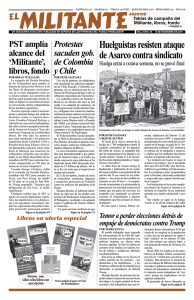
The following is a chapter excerpted from The Turn to Industry: Forging a Proletarian Party by Socialist Workers Party National Secretary Jack Barnes. The Militant ran the new book’s introduction in its Nov. 11 issue, and will continue to publish further excerpts.
Marvel Scholl, a 50-year cadre of the Socialist Workers Party, was a leader of the women’s auxiliary during the 1934 strikes and organizing drive led by Teamsters Local 574 (later 544) in Minneapolis. She served on the staff of the local’s Federal Workers Section, which organized the unemployed to fight for their interests during the Great Depression. Scholl contributed to the Northwest Organizer, the Minneapolis Teamsters weekly. In the 1960s and 1970s she wrote regularly for the Militant, including for many years the National Picket Line column. The following article appeared in the April 14, 1972, issue of the Militant. Copyright © 2019 by Pathfinder Press. Reprinted by permission.
The Militant has many new readers, many of whom have never belonged to trade unions. Therefore, it’s possible that the words “bureaucrat” and “bureaucracy” applied to the organized labor movement may not have much meaning or may be confused with the government hacks who wrap everything up in yards of red tape in order to maintain the status quo.
While there are a great many similarities between the government and trade-union bureaucracies, there are almost as many differences, particularly in how each type of bureaucrat or bureaucracy got that way.
The trade-union officialdom, especially in the higher echelons, is composed of elected officers who have interpreted their own international constitutions in such a way as to practically perpetuate themselves in office — some of them for life, but most of them, in any case, long after they have outlived their usefulness. This is done by rigging the conventions where most international officers are elected or by questionable balloting procedures in referendum votes. But the men and women who make up this select coterie are not those I would like to discuss.
It is the men and women in the lower and middle echelons of the hierarchy, the business agents and organizers, that need examining. These people are charged directly with keeping the rank and file in order, riding herd on them in strike situations, and getting them out to vote for the Democratic “friends of labor.”
Some of these lower-echelon union officials “got on the pie,” as workers characterize getting on the union payroll, with malice aforethought — demonstrating their militancy in the plant primarily to further their own ambitions.
But many others got there by another route — being kicked upstairs in order to get them out of the hair of both management and the union hacks.
Let’s take a not-so-mythical example of one militant trade-unionist who was turned into a typical bureaucrat.
Joe Jones worked on the line in an auto plant, alongside his best friend, Jack. Both men’s families had a close social life. Jack was a good union militant, but not an aggressive one. He looked to Joe for leadership and supported him as the section grievance-committee man (“griever”).
Joe worked hard attempting to settle the many beefs the rank-and-file workers had. He honestly believed in enforcing the contract to the letter.
Joe was a World War II veteran and joined the union after his discharge from the Army. He came from an old-line trade-union family. Both his father and his grandfather had been part of the great strike wave of the 1930s. He had listened to many stories from them about the days when the rank and file in these new industrial unions controlled their own leadership.
As a griever he tried to do his job. In the eyes of both the company and the local union hierarchy he became a “gadfly.” At one point, angered at the growing number of unsettled grievances in his file, he fought with a foreman and was fired. Word went through the plant like wildfire and all the men walked off the job. Joe got his job back.
By now both management and the union hacks knew they had to do something about Joe.
Management decided to offer him a supervisory job — an old gimmick that sometimes succeeded in making the former union militant one of the best of company men.
But the union officialdom beat the company to the punch. They had discussed Joe and decided that the best way to handle him was to kick him upstairs, onto the union payroll.
After some hesitation, Joe accepted. He felt that in such a post he would be better able to help his own men.
He started out that way. His fellow organizers warned him that his efforts would be fruitless, but he tried anyway. He kept close contact with his former assembly-line friends, visited the job daily, tried to force definitive decisions on grievances and violations. In meetings with the management and union officials above him, he began to feel as though he were fighting two enemies.
He griped a lot and considered going back into the plant, but his much higher salary as a union hack got in the way. His family now had a new home in a much nicer neighborhood and a new car. This “better way of life” was changing Joe’s whole outlook. He stopped visiting the plant every day, avoided the grievance-committee men who swarmed over him when he did come in, and spent less and less time socializing with his best friend, Jack.
He didn’t like himself much, but held onto the idea that he could still do something concrete for the workers in the plant.
Gradually, he settled into his new role, began to accept the frustrations that went with it, and became just another lower-echelon bureaucrat—a “leader” with his eye out for promotions within the hierarchy.
His former close friends watched Joe change from a fighting militant into a well-trained, tamed, and contented union hack — one they could not remove. They hadn’t elected him, so they had no recourse to the unions’ constitutional provisions for recall.
More and more, Joe went along with the district and local union bureaucracy and the international leadership. He had been house-trained.

